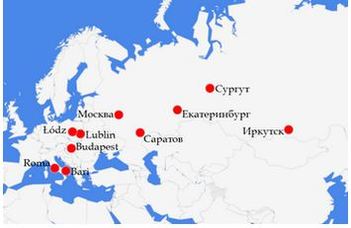Press research in Russian emigration
The first session explored the layers of emigration in literature. The session was chaired by Julia Matveeva, Professor of Literary History at URFU (Ekaterinburg). The second session focused on the role of emigration press in preserving identity. The session was chaired by Professor Maria Cymborska-Leboda, a literary historian from the Maria Curie-Skłodowska University in Lublin. The third session was chaired by historian Yulia Rousina from the URFU (Yekaterinburg), during this session they examined the phenomenon of emigration from a military-political perspective.
The fourth session focused on the Far East and was led by Professor Dmitry Kozlov, a historian from Irkutsk. The fifth session focused on the Soviet press of the first wave of Russian emigration, led by Zoltán György Józsa, a literary historian at ELTE. The sixth session detailed European and American celebrities of the first wave of Russian emigration. The session was chaired by literary historian Erzsébet Schiller (ELTE Savaria University Centre).
It became clear from the presentations that the press is a very rewarding source material for the first wave of emigration. There was extremely active and diverse press activity in the different emigration centers, and it is quite interesting to compare the publications abroad with the press in the Soviet Union in the 1920s.
The presentations on the Far East were also of great interest this time, as they continue to hold many novelties even for experienced researchers of the first wave of emigration, which had focused on Europe until now.
The presentations on the early manifestations of celebrities also offered interesting consequences, in that they highlighted the substantial differences between the celebrity mentality of the time and that of today.
At the beginning of the 20th century, the quest for popularity was generally not an end in itself, but a means to provide an opportunity for cultural value creation which could not be funded otherwise.
A total of 70 presentations took place at the three symposia held so far. The fourth meeting of the series will take place on 26 November, also through ZOOM. A collective monograph summarizing the presentations will be created in the first half of 2022.
Source: ELTE BTK

